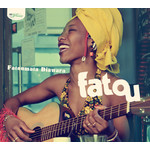
Fatou
 $30.00
Out of Stock
$30.00
Out of Stock6+ weeks add to cart more by this artist
Fatoumata Diawara
Fatou
[ BMG / ADA / CD ]
Release Date: Monday 10 October 2011
This item is currently out of stock. It may take 6 or more weeks to obtain from when you place your order as this is a specialist product.
Born in Cote d'Ivoire and raised in southern Mali, Diawara grew up hearing Wassoulou music, a song style that's thought by some ethnomusiclogists to be one of the main pre-colonial ancestors of blues.
"In her teens, Fatoumata Diawara moved to France to pursue an acting career. She appeared in a handful of films and worked with a street theater troupe but really found her calling later, when she took up the guitar and started writing songs. Born in Cote d'Ivoire and raised in southern Mali, Diawara grew up hearing Wassoulou music, a song style that's thought by some ethnomusiclogists to be one of the main pre-colonial ancestors of blues. The Wassoulou cultural area is now split between three countries, but it has a history that extends back centuries, and Diawara merges that long, traditional history with a modern, globalized sensibility on her debut album.
Diawara has honed her performing and recording craft through work with AfroCubism, Orchestre Poly-Rythmo, and Herbie Hancock, among others, so really the big step here is to recording her own songs with her own arrangements. She has a voice with a naturally sensual glide to it that sometimes reminds me a little of Sade. Unlike many of her peers, such as Oumou Sangaré, power is not really a part of her style-- she keeps her singing even and steady to complement the hypnotic, cycling guitar parts of her arrangements. The album is quietly intense, rarely rising above the volume of ordinary conversation.
Diawara sings in her native Wassoulou language, but understanding the exact content of the songs isn't necessary to enjoy them. There's plenty of information in the melodies and rhythms, and inventive musicianship as well. Diawara locks in with the simmering funk backdrop of "Bissa" by playing harmonics on her guitar instead of full chords. The electric leads seem to float up out of the patterns; several times over the course of the album, I found myself caught up in a flowing solo that I didn't even notice when it started. This is how the whole record works. There's no fanfare, nothing is announced. It simply surrounds you with its atmosphere.
It is an ultimately beguiling album because of this. Even in its most demonstrative moments, such as the shivering lead guitar line that opens "Bakonoba", it's a record you can sink into and enjoy for its sonics as well as its songwriting. "Bakonoba" is among the songs with the strongest West African character, and that guitar is a big part of it - it's reminiscent of the type of lead Malian guitarists Djelimady Tounkara or Kanté Manfila might have once laid down for the Rail Band. Otherwise, Diawara is one of a growing number of musicians working on a sort of pan-folk sound that incorporates influences from across a broad Afro-Western cultural spectrum. It's an approach that may be a better fit for the "world music" label than any of the highly localized sounds that tag's often applied to."
- Pichfork
Tracks:
1. Kanou
2. Sowa
3. Bakonoba
4. Kèlè
5. Makoun Oumou
6. Sonkolon
7. Alama
8. Bissa
9. Mousso
10. Wililé
11. Boloko
12. Clandestin